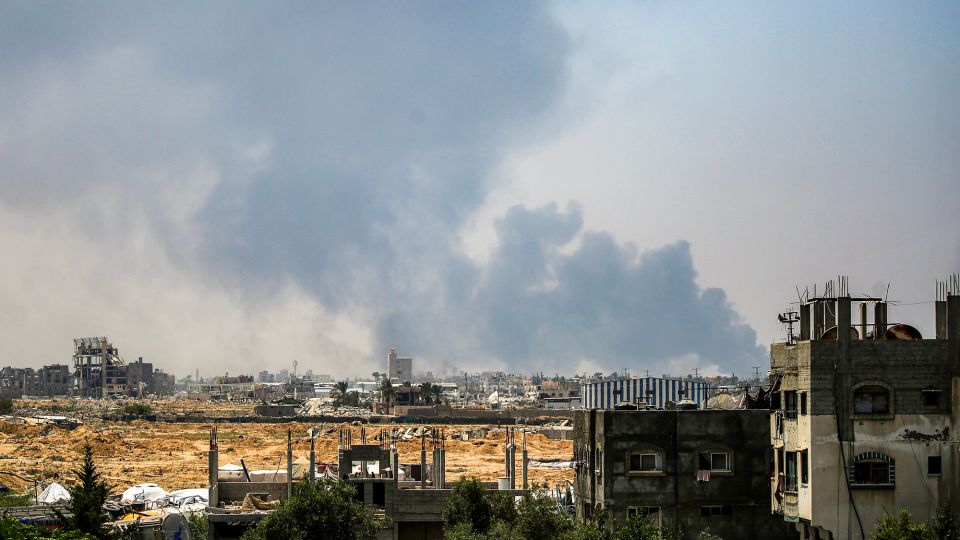Israeli Ground Operations Begin in Central Gaza
Israeli tanks have entered a part of central Gaza that has not previously experienced ground operations during the 21-month conflict, according to Israeli media, aid agencies, and witnesses. The Israel Defense Forces (IDF) did not comment on its actions, but Israel Army Radio reported that the operation had started. It stated that the IDF’s Golani Brigade had begun a ground maneuver in the southern Deir al-Balah area, following aerial and artillery strikes the night before.
The radio noted that the maneuver currently involves only one brigade and is expected to continue for several weeks. On Sunday, the Israeli military ordered Palestinians to evacuate an area of nearly 6 square kilometers (2.3 square miles) and dropped thousands of leaflets in Deir al-Balah. The IDF Arabic language spokesperson emphasized that the military continues to operate with great force to destroy the enemy’s capabilities and terrorist infrastructure in the area, expanding its activities into regions where it has not operated before.
Israeli media has reported that the IDF has been hesitant to conduct ground operations in Deir al-Balah due to concerns about endangering surviving hostages who may be held there. The Hostages Families Forum expressed alarm over the assault and demanded the government explain why the offensive in Deir al-Balah does not put the hostages at serious risk.
Humanitarian Crisis Intensifies
Medical Aid for Palestinians (MAP), which has staff in the Deir al-Balah area, reported that Israeli forces launched a ground and air assault on Monday. MAP’s Communications Officer in Gaza, Mai Elawawda, described the situation as “extremely critical.” She said that shelling was occurring around their office, and military vehicles were just 400 meters away from colleagues and their families.
Witnesses spoke with people leaving the area on Monday, amid explosions and artillery fire. Several residents mentioned intense fire and airstrikes overnight. Umm Ali al-Qayed, a displaced mother, said she left a tent without any belongings. She shared that she is a mother of four martyrs and has been displaced three times. Mohammed Abu Amous, another evacuee, said they were told to leave, with artillery and strikes falling on them all night.
Attef Abu Mousa, who was carrying a tarpaulin sheet, mentioned that he had set up and taken down his tent 13 times, calling the current night particularly difficult. Abdallah Awar said his family left with nothing but the clothes they were wearing, expressing frustration over the ongoing crisis.
UN Warns of Dire Consequences
The United Nations warned that the evacuation order had dealt a devastating blow to the already fragile lifelines keeping people alive across the Gaza Strip. The UN’s Office for the Coordination of Humanitarian Affairs (OCHA) estimated that 50,000 to 80,000 people were in the area at the time, many of whom were already in displacement sites.
The newly designated evacuation area includes several humanitarian warehouses, medical facilities, and critical water facilities, OCHA warned, stating that damage to this infrastructure would have life-threatening consequences. With this latest order, the area of Gaza under displacement orders or within Israeli-militarized zones has risen to 87.8%, leaving 2.1 million civilians squeezed into a fragmented 12% of the Strip.
Impact on Medical Services
The World Health Organization (WHO) reported that its staff residence and main warehouse in Deir al-Balah were attacked, with two staff members and two family members detained. All but one were later released. WHO Director-General Tedros Adhanom Ghebreyesus posted on X demanding the release of the detained staff member.
He noted that WHO staff and family members were forced to evacuate on foot to Al-Mawasi amid active conflict. The latest evacuation order affected several WHO premises, impacting the agency’s ability to operate in Gaza. The main warehouse in Deir al-Balah was damaged after an attack caused explosions and a fire inside. With the warehouse nonfunctional and most medical supplies in Gaza depleted, WHO is severely constrained in supporting hospitals and health partners already short on medicines, fuel, and equipment.







